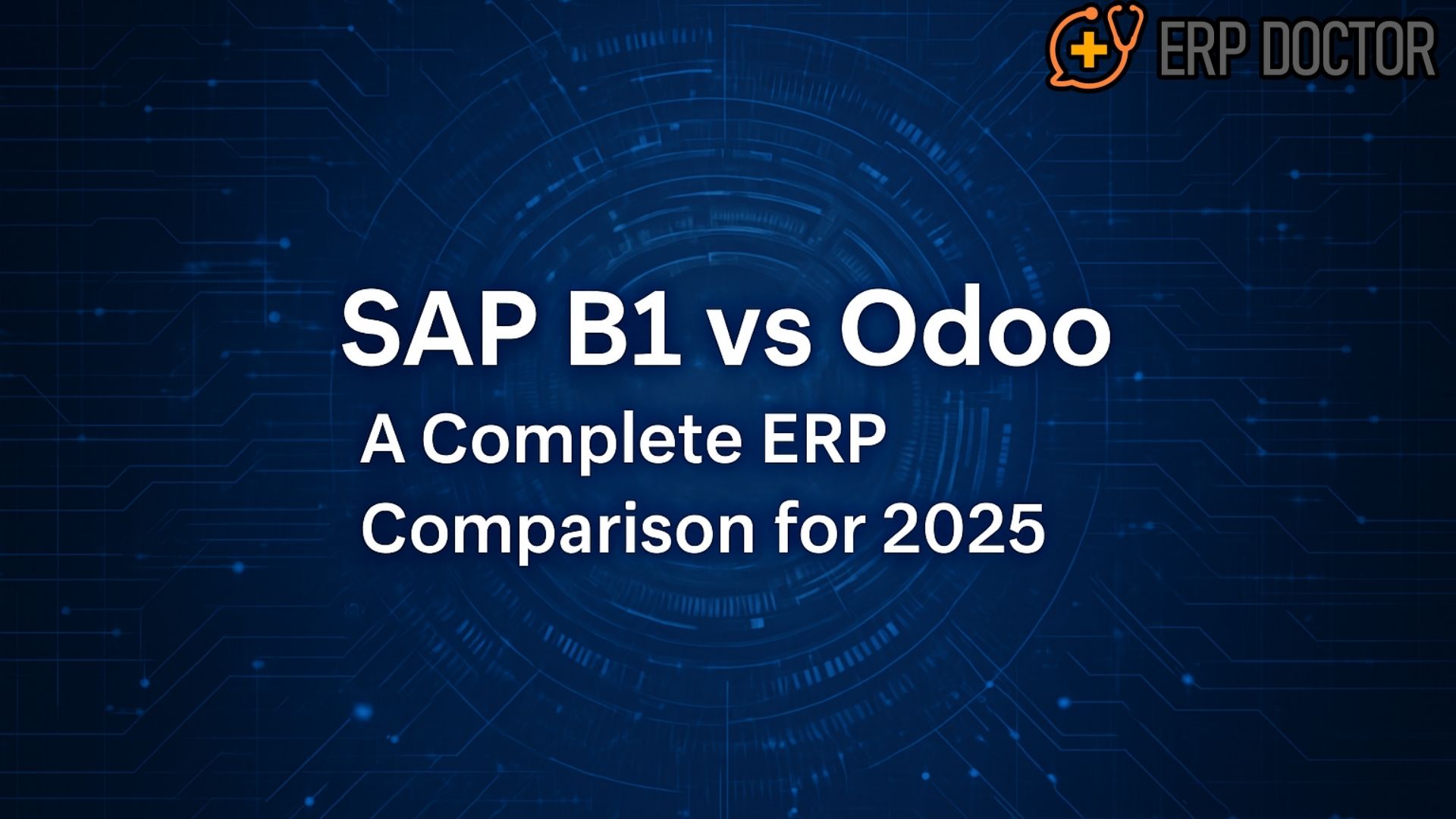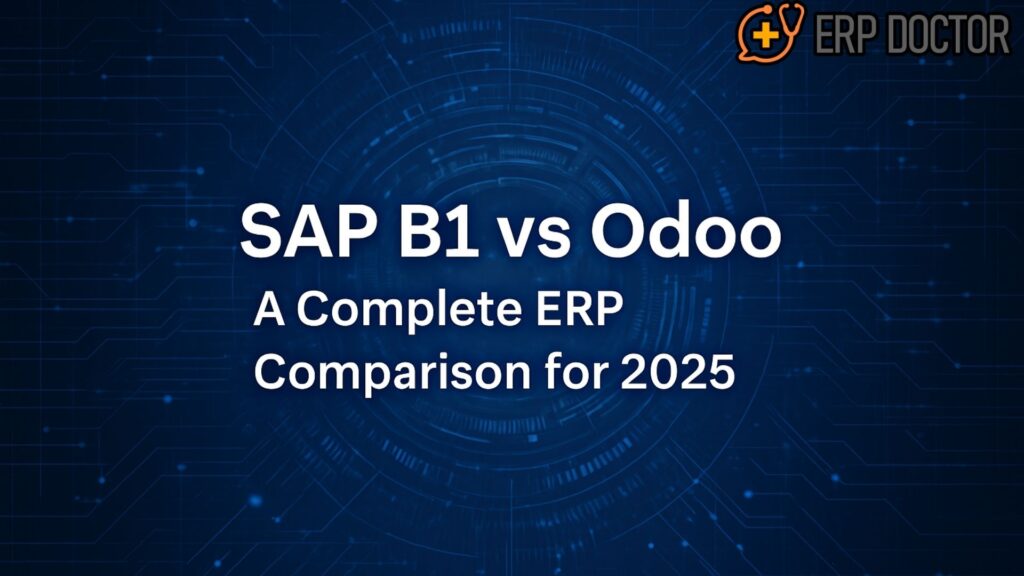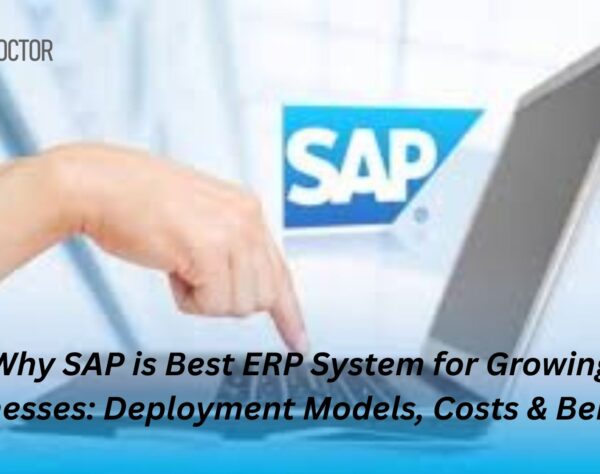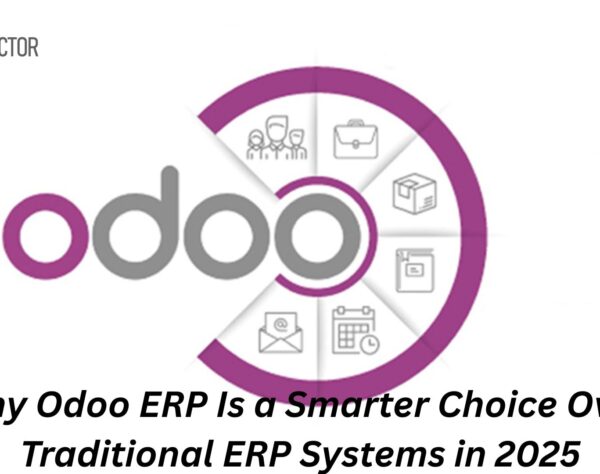
SAP B1 vs Odoo: A Complete ERP Comparison for 2025

Is SAP B1 or Odoo the Better Choice for Smarter Business in 2025?
🧭 Introduction: A Crossroads in ERP Evolution
As businesses grow beyond spreadsheets and disconnected tools, the quest for the perfect ERP becomes a strategic decision. Two standout players—SAP Business One (SAP B1) and Odoo—frequently come into the conversation. While SAP B1 brings the legacy and reliability of global ERP expertise, Odoo enters with the flexibility and innovation of a modular, open-source system.
But which one suits your company in 2025? This blog dissects the differences between SAP Business One and Odoo in terms of architecture, flexibility, cost, scalability, and user experience—helping you make a clear and confident decision.
🔍 SAP Business One vs Odoo: Foundational Philosophies
SAP Business One – The Engineered Enterprise Core
SAP Business One, or SAP B1, is a centralized ERP platform designed to handle complex operational needs—finance, inventory, production, sales, service, and compliance—all from a single ecosystem. It offers deep integrations with SAP HANA, multi-location support, and global compliance frameworks.
Think of SAP B1 as an engineered control room—structured, secure, and powerful.
Odoo – The Modular Innovation Lab
Odoo, by contrast, is a modular, open-source ERP where you choose the apps you need—from CRM to HR, eCommerce to MRP. Businesses can scale from a simple invoicing app to a complete ERP suite, all while keeping the interface and experience consistent.
Imagine Odoo as a sandbox where you build your perfect ERP from the ground up.
🎯 Functionality Face-Off: Module by Module
Let’s explore how each system performs across essential business areas.
🔄 CRM & Customer Engagement
- Odoo: Offers one of the most intuitive and powerful CRM modules in the mid-market space. Integrated email marketing, lead scoring, and opportunity tracking make it a sales rep’s dream.
- SAP B1: Comes with built-in CRM functionality, sufficient for account tracking, service management, and customer data—though it may require add-ons for advanced marketing automation.
Verdict: For CRM-first companies, Odoo takes the lead in sales experience.
📦 Inventory & Supply Chain
- SAP B1: Strong in warehouse management, serial and batch tracking, BoM, and real-time inventory control. Perfect for industries with compliance needs.
- Odoo: Offers solid inventory capabilities, enhanced through add-ons, but may require configuration for complex workflows.
Verdict: For compliance-heavy or highly structured inventory needs, SAP Business One is more suitable.
📊 Finance & Accounting
- SAP B1: Deep financial functionality with strong audit controls, multi-currency handling, fixed assets, and region-specific tax setups.
- Odoo: Manages invoicing, payments, and basic accounting well. Advanced capabilities are available via paid modules.
Verdict: For advanced financial control and compliance, SAP B1 outshines Odoo.
🛠️ Manufacturing & MRP
- SAP B1: Built-in MRP engine supports multi-level BoM, routing, and work orders—ideal for discrete and process manufacturing.
- Odoo: Modular MRP with work centers, BoM, and scheduling; flexibility shines, but performance varies by customization.
Verdict: Manufacturers with standardization needs should lean toward SAP B1, while agile makers may benefit from Odoo’s customizability.
🌐 Globalization & Compliance
- SAP Business One: Comes pre-configured with localization packs, country-specific tax compliance, and audit-ready tools.
- Odoo: Community modules offer localization, but support and reliability vary by region.
Verdict: SAP B1 is built for multinational operations and regulated industries.
🧩 User Experience & Customization
- Odoo: Clean, modern UI that feels like a cloud-native app. Developers can tweak almost anything thanks to open-source flexibility.
- SAP B1: Professional UI, less flashy but deeply structured. Customization often requires working with certified SAP partners.
Who wins?
If you want freedom to experiment and adapt quickly, Odoo excels. If you prefer structure and standardization, SAP Business One is more reliable.
💸 Cost Considerations
- Odoo: Offers a free community version. The enterprise edition is charged per user, per app.
- SAP B1: Typically has higher licensing and implementation costs but offers greater long-term ROI for stable operations.
Hidden Costs to Watch:
- Odoo: Custom development and app conflicts may lead to additional expenses.
- SAP B1: Custom modules and SAP partner support come at a premium.
🧠 Implementation: Fast and Flexible vs Structured and Strategic
- Odoo: Agile businesses can roll out essential modules in weeks.
- SAP B1: Requires more structured implementation timelines but results in rock-solid systems.
🌱 Scalability & Future Growth
- SAP B1: Built to scale with multi-entity operations, advanced integrations, and global expansion.
- Odoo: Grows with your business via modular expansion but may require more oversight to manage system complexity.
🧾 Final Analysis: Who Should Choose What?
| Business Type | Best Fit |
|---|---|
| Growing Startup | Odoo |
| Manufacturing SME | SAP B1 |
| B2B Sales Company | Odoo |
| Multi-branch Retailer | SAP B1 |
| eCommerce Business | Odoo |
| Regulated Industry Firm | SAP B1 |
📌 FAQs
1. Can Odoo support FDA or ISO-compliant documentation like SAP B1?
Not out of the box. Odoo requires third-party modules, while SAP B1 has built-in compliance tools for regulated industries.
2. How do SAP B1 and Odoo handle complex multi-currency scenarios?
SAP B1 supports robust multi-currency environments by default, while Odoo needs custom configuration for complex currency workflows.
3. Is SAP Business One suitable for hybrid retail-manufacturing models?
Yes. SAP B1 supports both retail POS and manufacturing modules, tightly integrated.
4. Can I use Odoo for subscription-based billing models?
Yes, Odoo offers a subscription app, which can be customized for tiered or usage-based billing.
5. Which ERP offers better version control for product development?
SAP B1 offers better document versioning for manufacturing specs, especially in aerospace, auto, and pharma.
6. Is it easier to onboard non-technical staff on Odoo or SAP B1?
Odoo’s UI is more intuitive for general users, while SAP B1 may require formal onboarding and training.
7. How does each ERP handle user permissions across modules?
Both platforms offer role-based permissions, but SAP B1 provides tighter enterprise-grade control.
8. Are mobile capabilities better in Odoo or SAP B1?
Odoo offers a responsive web experience and native apps. SAP B1 has mobile apps but may lack some UI fluidity.
9. Can both systems support barcode scanning and IoT integration?
Yes, both support it, but SAP B1 is more stable for high-volume warehouse environments.
10. What’s the long-term upgrade path for SAP B1 and Odoo?
SAP B1 has scheduled updates and enterprise support. Odoo upgrades depend on your hosting model and may require developer support.







